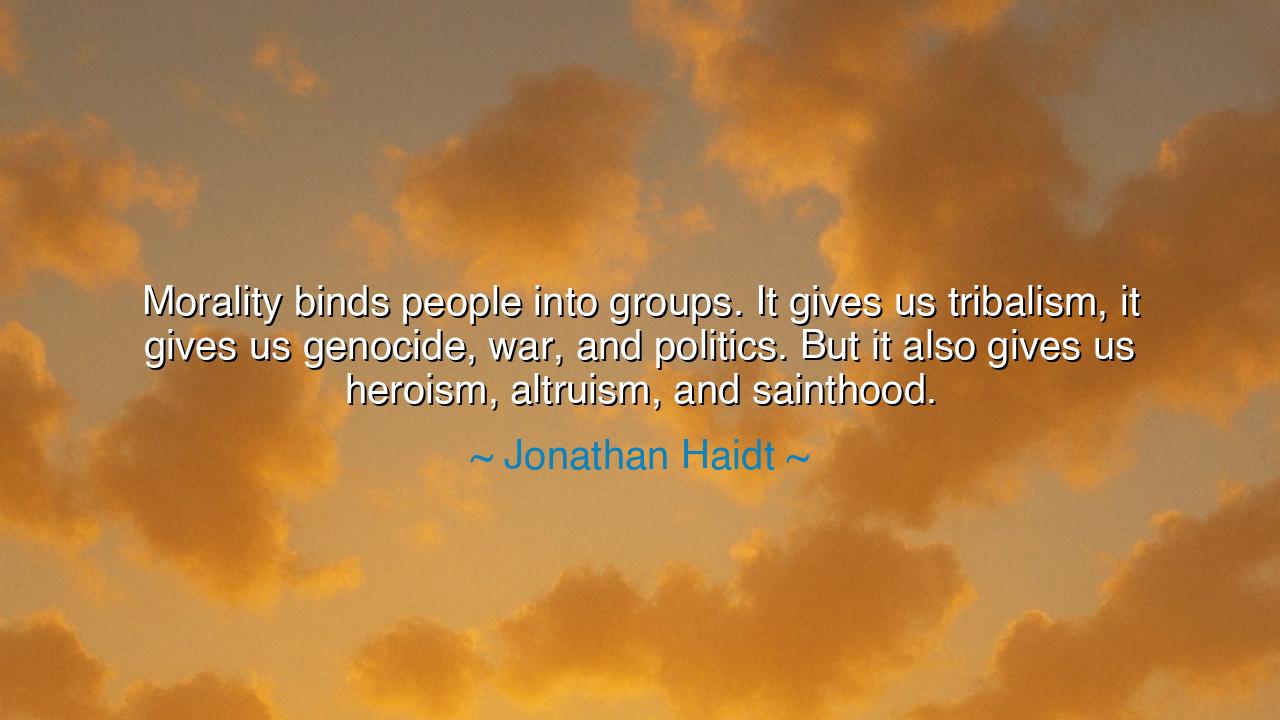
Morality binds people into groups. It gives us tribalism, it
Morality binds people into groups. It gives us tribalism, it gives us genocide, war, and politics. But it also gives us heroism, altruism, and sainthood.






The moral psychologist Jonathan Haidt once proclaimed with the voice of a sage: “Morality binds people into groups. It gives us tribalism, it gives us genocide, war, and politics. But it also gives us heroism, altruism, and sainthood.” In this vision, he reveals the double-edged sword of morality: that which lifts mankind to its noblest heights is the same force that drags it into its darkest abysses. For morality is not merely a private compass—it is a social glue, shaping communities, forging tribes, and uniting men in common cause, whether for good or for evil.
The origin of this saying lies in Haidt’s research into moral psychology, where he studied how values are not only about right and wrong but about binding individuals into collective identities. From the smallest village to the greatest empire, morality has always been the invisible hand that unites, commanding loyalty to the group above the self. Yet in binding us together, it also divides us from others, for every “us” implies a “them.” Here lies its peril and its promise.
History shows this truth with searing clarity. The Crusades of the Middle Ages were driven by religious morality. Knights, priests, and peasants believed themselves holy warriors, bound together by divine purpose. Their unity gave them courage, discipline, and willingness to sacrifice everything. Yet this same moral fire also justified slaughter, conquest, and rivers of blood. Thus, the same morality that inspired heroism also birthed genocide and war.
But history also offers the brighter face of morality. In the American civil rights movement, Dr. Martin Luther King Jr. called upon the morality of justice, equality, and love. Thousands marched, sang, and suffered together, bound not by hatred but by a moral vision of human dignity. Their unity gave them strength to endure violence without returning it, to suffer humiliation without surrender. In this, Haidt’s words shine: morality does not only create tribalism, it also gives birth to altruism and even sainthood.
The deeper meaning is that morality is not inherently good or evil; it is power. It binds men together, giving them courage beyond their own strength, but it can just as easily drive them to destroy those outside their group. It is like fire: it can warm and sustain, or it can consume and annihilate. To recognize this duality is to gain wisdom, for one who knows the double nature of morality can guard against its dangers while drawing upon its light.
For us who live today, the lesson is urgent. We see politics turning into tribal battles, each side convinced of its moral superiority. We see nations justifying wars in the name of morality, while others are inspired by morality to serve the poor, protect the earth, or risk their lives for strangers. The choice is before us: whether our morality will be narrow, binding us into tribes of exclusion, or expansive, binding us into communities of compassion.
Therefore, let this wisdom endure: do not be blind to the double edge of morality. It is both the root of hatred and the seed of holiness. Choose to use it not to divide but to unite, not to destroy but to heal. Bind yourself to others with generosity, not cruelty; with sacrifice, not domination. For in doing so, you will transform the same force that has fueled war and genocide into the power that gives rise to heroism, altruism, and the light of sainthood.






VTtrinh van thang
This quote from Haidt really speaks to the power of morality in shaping human societies, both for good and ill. It reminds me that morality is not inherently good or bad, but something that can be twisted by the groups that adopt it. It’s a stark reminder of how our values can be used to justify both the highest ideals and the darkest actions. How do we ensure we are promoting morality in a way that encourages unity and compassion rather than division?
TTNguyen Thi Thua
Haidt’s statement is a thought-provoking exploration of the complexity of morality. While it can inspire acts of goodness like altruism and heroism, it can also drive people to commit horrific acts in the name of a higher cause. It raises an important question: is morality always tied to group identity and division? Can we ever truly have a universal moral framework that unites rather than divides us?
2L20. Luong
I think Haidt’s view on morality is both enlightening and troubling. The fact that morality can foster both sainthood and genocide shows its complex role in shaping human behavior. It makes me wonder, in a world that often feels divided, is it possible for us to embrace a shared morality that transcends tribalism? How can we harness the positive aspects of morality without falling into the trap of divisiveness?
LNLinh Nguyen
This quote is fascinating because it shows the dual nature of morality—it can lead to unity and self-sacrifice, but also to destruction and violence. It makes me wonder, do we, as a society, use morality to justify the things we believe in, even when they harm others? And if morality can lead to both good and bad outcomes, how do we distinguish between the two and ensure we are using it for positive purposes?
HHhuong huong
Haidt’s quote strikes me because it highlights how morality, while often seen as a positive force, can also have darker consequences. Morality can unite people for good causes like heroism and altruism, but it can also justify harmful actions like war and genocide. This makes me question: can we have morality without creating divisions? Is it possible to hold onto the good aspects of morality without triggering tribalism or conflict?